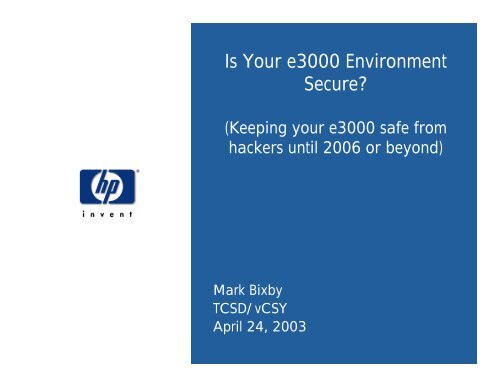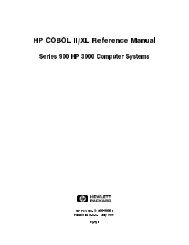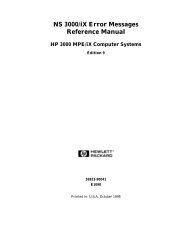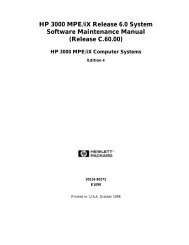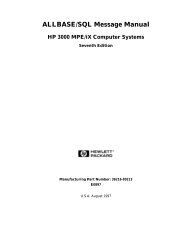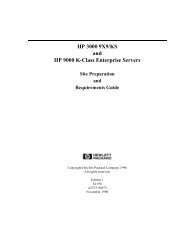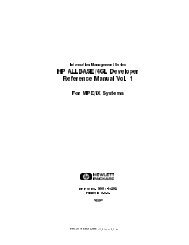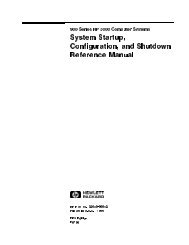April 24, 2003 - HP MM Support
April 24, 2003 - HP MM Support
April 24, 2003 - HP MM Support
- No tags were found...
You also want an ePaper? Increase the reach of your titles
YUMPU automatically turns print PDFs into web optimized ePapers that Google loves.
Is Your e3000 Environment<br />
Secure<br />
(Keeping your e3000 safe from<br />
hackers until 2006 or beyond)<br />
Mark Bixby<br />
TCSD/vCSY<br />
<strong>April</strong> <strong>24</strong>, <strong>2003</strong>
Presentation overview<br />
• Getting started with security on MPE<br />
• Auditing<br />
• Authentication<br />
• Authorization<br />
• Networking (general and product-specific)<br />
• :STORE/:RESTORE<br />
• Denial of service<br />
• People & processes<br />
• The future<br />
• Real-life security stories from the audience<br />
• General Q&A<br />
<strong>April</strong> <strong>24</strong>, <strong>2003</strong><br />
Is Your Homestead Secure - Solution Symposium West<br />
page 2
Getting started with security on MPE<br />
<strong>April</strong> <strong>24</strong>, <strong>2003</strong><br />
Is Your Homestead Secure - Solution Symposium West<br />
page 3
Security-related documentation<br />
• Accessing Files Programmer's Guide<br />
• New Features of MPE/iX: Using the Hierarchical File<br />
System (see also :XEQ POSIXCBT.LSN.SYS)<br />
• Performing System Management Tasks<br />
• Manager's Guide to MPE/iX Security<br />
• User's Guide to MPE/iX Security<br />
• <strong>HP</strong> Security Monitor/iX Manager's Guide<br />
• <strong>HP</strong> Security Monitor/iX User's Guide<br />
<strong>April</strong> <strong>24</strong>, <strong>2003</strong><br />
Is Your Homestead Secure - Solution Symposium West<br />
page 4
System logging<br />
• Enabled via :SYSGEN<br />
• Logging event data written to LOG####.PUB.SYS<br />
• :SHOWLOG – displays current log file<br />
• :SWITCHLOG – switches to a new log file<br />
• Use LOGTOOL.PUB.SYS or third-party utilities to display<br />
key logging events periodically<br />
• Enable as many logging events as you can!<br />
<strong>April</strong> <strong>24</strong>, <strong>2003</strong><br />
Is Your Homestead Secure - Solution Symposium West<br />
page 5
System logging events<br />
• 100 - System Logging<br />
• 101 - System Up<br />
• 102 - Job Initiation<br />
• 103 - Job Termination<br />
• 104 - Process Termination<br />
• 105 - NM File Close<br />
• 106 - System Shutdown<br />
• 107 - Power Failure<br />
• 111 - I/O Error<br />
• 112 - Physical Mount/Dismount<br />
• 113 - Logical Mount/Dismount<br />
• 114 - Tape Label<br />
<strong>April</strong> <strong>24</strong>, <strong>2003</strong><br />
Is Your Homestead Secure - Solution Symposium West<br />
page 6
System logging events (cont.)<br />
• 115 - Console Log<br />
• 116 - Program File Event<br />
• 120 - Native Mode Spooling<br />
• 121 - File Quarantine Event<br />
• 127 - Chdir<br />
• 128 - Process Adoption<br />
• 129 - File Owner Change<br />
• 130 - Architected InterFace<br />
• 131 - Additional Processor Launch<br />
• 134 - Password Change<br />
• 135 - System Logging Configuration<br />
• 136 - Restore<br />
<strong>April</strong> <strong>24</strong>, <strong>2003</strong><br />
Is Your Homestead Secure - Solution Symposium West<br />
page 7
System logging events (cont.)<br />
• 137 - Printer Access Failure<br />
• 138 - ACD Change<br />
• 139 - Stream Initiation<br />
• 140 - User Logging<br />
• 141 - Process Creation<br />
• 142 - Security Configuration Change<br />
• 143 - Chgroup<br />
• 144 - File Open<br />
• 145 - CI Command Logging<br />
• 146 - Maintenance Request<br />
• 148 - UPS Monitor Event Logging<br />
<strong>April</strong> <strong>24</strong>, <strong>2003</strong><br />
Is Your Homestead Secure - Solution Symposium West<br />
page 8
System logging events (cont.)<br />
• 150 - Diagnostic Information<br />
• 151 - High Priority Machine Check<br />
• 152 - Low Priority Machine Check<br />
• 155 - Directory Open/Close Logging<br />
• 160 - CM File Close<br />
<strong>April</strong> <strong>24</strong>, <strong>2003</strong><br />
Is Your Homestead Secure - Solution Symposium West<br />
page 9
Auditing<br />
<strong>April</strong> <strong>24</strong>, <strong>2003</strong><br />
Is Your Homestead Secure - Solution Symposium West<br />
page 10
There's more than just the console and<br />
system logging<br />
• Many subsystems use separate logging facilities:<br />
– INETD – JINETD $STDLIST spoolfile<br />
– Apache - /APACHE/PUB/logs<br />
– DNS BIND/iX – syslog (and possibly the console)<br />
– Samba - /usr/local/samba/var<br />
– Sendmail – syslog (and possibly the console)<br />
• Home-grown applications<br />
• Third-party applications<br />
• ALL logs need to be checked periodically for anomalies<br />
<strong>April</strong> <strong>24</strong>, <strong>2003</strong><br />
Is Your Homestead Secure - Solution Symposium West<br />
page 11
Where did that :HELLO come from<br />
• System logging and console messages don't include the<br />
IP address for terminal logons/logoffs<br />
• A system logon UDC could be used to capture the<br />
<strong>HP</strong>REMIPADDR CI variable for successful logons<br />
• But there is currently no way on MPE to capture the IP<br />
address of a failed VT-MGR logon attempt<br />
• Enable INETD connection logging option (-l) to track all<br />
telnet connections<br />
• Use external firewall SYN logging<br />
<strong>April</strong> <strong>24</strong>, <strong>2003</strong><br />
Is Your Homestead Secure - Solution Symposium West<br />
page 12
Which files have been :RELEASEd<br />
• :RELEASE is a great convenience for relaxing file<br />
security, but it opens major security holes<br />
• There are no FOS tools to conveniently scan for<br />
:RELEASEd files, but you can do this from the CI:<br />
file temp;rec=,,b;disc=2147483647<br />
listfile /,3 >*temp<br />
xeq awk.hpbin.sys "'&<br />
$1 == ""FILE:"" { file=$2 } &<br />
/SECURITY IS OFF/ { print file}'"
Which files are world-writable<br />
• World-writable files are equally risky<br />
• To search for all world-writable files using the POSIX<br />
shell:<br />
find / -perm –o+w –a ! –type l | xargs ls –ld<br />
• Then tighten security if appropriate<br />
<strong>April</strong> <strong>24</strong>, <strong>2003</strong><br />
Is Your Homestead Secure - Solution Symposium West<br />
page 14
Who is using special capabilities (I.e. SM,<br />
OP, PM)<br />
• No FOS tools for conveniently auditing special<br />
capability usage<br />
• Vesoft's VEAUDIT/3000 product does a good job<br />
• You could scan :LISTACCT, :LISTUSER, :LISTGROUP<br />
output for account, user, and group usage<br />
• You could scan VERSION.PUB.SYS output for program<br />
file usage<br />
<strong>April</strong> <strong>24</strong>, <strong>2003</strong><br />
Is Your Homestead Secure - Solution Symposium West<br />
page 15
Listing all users with SM, OP, or PM<br />
capability<br />
file temp;rec=,,b;disc=2147483647<br />
listuser @.@ >*temp<br />
xeq awk.hpbin.sys "'&<br />
/^USER:/ { user=$2 } &<br />
/^CAP:.*(SM|OP|PM)/ { print user}'"
Listing all PROG files with PM capability<br />
file temp;rec=,,b;disc=2147483647<br />
listfile @.@.@,6;seleq=[code=prog] >*temp<br />
file temp2;rec=,,b;disc=2147483647<br />
xeq version.pub.sys *temp2<br />
xeq awk.hpbin.sys "'&<br />
/^VERSION>/ { getline; getline prog } &<br />
/^CAP:.*PM/ { print prog }'"
Listing all NMPRG files with PM capability<br />
file temp;rec=,,b;disc=2147483647<br />
listfile @.@.@,6;seleq=[code=nmprg] >*temp<br />
file temp2;rec=,,b;disc=2147483647<br />
xeq version.pub.sys *temp2<br />
xeq awk.hpbin.sys "'&<br />
/^VERSION>/ { getline; getline prog } &<br />
/^CAPABILITIES:.*PM/ { print prog }'"
Who can write to priv-mode groups<br />
• Non-prived users who can write to CAP=PM groups<br />
essentially have priv-mode capabilities<br />
• Make sure group-level security has restricted write and<br />
save access to authorized users<br />
• Make sure program files in PM groups are not<br />
:RELEASEd or writable by by unauthorized users<br />
• Process :LISTACCT/:LISTGROUP/:LISTFILE output<br />
yourself, or just purchase Vesoft's VEAUDIT/3000<br />
<strong>April</strong> <strong>24</strong>, <strong>2003</strong><br />
Is Your Homestead Secure - Solution Symposium West<br />
page 19
Would you know it if a hacker replaced a<br />
system file with a trojan horse<br />
• Monitor system logging for unauthorized file open/close<br />
events<br />
– but what if a hacker disabled system logging or sanitized<br />
the log files<br />
• Build a database of file checksums and other attributes<br />
for comparison purposes to detect file changes<br />
– Update the database after legitimate file changes<br />
– Various open source solutions – TripWire, Osiris, etc<br />
<strong>April</strong> <strong>24</strong>, <strong>2003</strong><br />
Is Your Homestead Secure - Solution Symposium West<br />
page 20
Tracking account/user/group object<br />
changes<br />
• Would you be able to tell if a hacker assigned SM or<br />
PM capability to some obscure user<br />
• Periodically compare :LISTACCT, :LISTUSER,<br />
:LISTGROUP output looking for any differences<br />
• Purchase <strong>HP</strong> Security Monitor/iX and enable command<br />
logging for :NEWACCT, :NEWUSER, :NEWGROUP,<br />
:ALTACCT, :ALTUSER, :ALTGROUP<br />
<strong>April</strong> <strong>24</strong>, <strong>2003</strong><br />
Is Your Homestead Secure - Solution Symposium West<br />
page 21
Command file SNAPU – taking a snapshot<br />
of user attributes<br />
file temp;rec=,,b;disc=2147483647<br />
listuser @.@;format=detail >*temp<br />
xeq awk.hpbin.sys "'&<br />
/^USER/ { user=$3 ; next } &<br />
/^(LOGON CNT|\*)/ { next } &<br />
{ sub(/ *$/,"""",$0); &<br />
printf ""%-17s %s\n"",user,$0 }'"
SNAPU output<br />
OPERATOR.SYS PASSWORD : **<br />
OPERATOR.SYS UID : 142<br />
OPERATOR.SYS GID : 1<br />
OPERATOR.SYS MAX PRI : 150<br />
OPERATOR.SYS LOC ATTR : $00000000<br />
OPERATOR.SYS HOME DIR : /SYS/OPERATOR<br />
OPERATOR.SYS LOGON CI : /SYS/PUB/CI<br />
OPERATOR.SYS CAP : GL,OP,UV,LG,ND,SF,BA,IA<br />
<strong>April</strong> <strong>24</strong>, <strong>2003</strong><br />
Is Your Homestead Secure - Solution Symposium West<br />
page 23
Compare SNAPU output to detect changes<br />
• :SNAPU >before<br />
• :save before<br />
• …time passes…<br />
• :SNAPU >after<br />
• :save after<br />
• :xeq diff.hpbin.sys 'BEFORE AFTER'<br />
2304c2304<br />
< OPERATOR.SYS CAP : GL,OP,UV,LG,ND,SF,BA,IA<br />
---<br />
> OPERATOR.SYS CAP : GL,OP,UV,LG,ND,SF,BA,IA,PM<br />
<strong>April</strong> <strong>24</strong>, <strong>2003</strong><br />
Is Your Homestead Secure - Solution Symposium West<br />
page <strong>24</strong>
System logging event #115 gives incomplete<br />
picture of console activity<br />
• Only a subset of CI commands are logged by event<br />
#115<br />
• Enable additional logging events to get a better picture<br />
of console activity<br />
• If you are really paranoid, purchase <strong>HP</strong> Security<br />
Monitor/iX and enable CI command logging for all<br />
commands and all users (might be overkill!)<br />
<strong>April</strong> <strong>24</strong>, <strong>2003</strong><br />
Is Your Homestead Secure - Solution Symposium West<br />
page 25
Perform periodic packet sniffing<br />
• :NETCONTROL TRACEON/TRACEOFF to capture<br />
packets, and :NMDUMP to format them<br />
• :NMDUMP is cumbersome and overly verbose, so using<br />
external packet sniffing tools might be a better choice<br />
• Connection attempts to unused TCP or UDP ports can<br />
indicate hacker scanning activity<br />
• tcpdump sniffer – www.tcpdump.org<br />
• Ethereal network analyzer – www.ethereal.com<br />
<strong>April</strong> <strong>24</strong>, <strong>2003</strong><br />
Is Your Homestead Secure - Solution Symposium West<br />
page 26
Auditing events across distributed systems<br />
• A single transaction may easily span multiple systems,<br />
each with their own clock of varying accuracy<br />
• Run NTP or other time synchronization software on each<br />
system so that event timestamps on one system may be<br />
correlated reliably with event timestamps on another<br />
system<br />
• NTP for MPE:<br />
http://jazz.external.hp.com/src/hp_freeware/ntp/<br />
<strong>April</strong> <strong>24</strong>, <strong>2003</strong><br />
Is Your Homestead Secure - Solution Symposium West<br />
page 27
Strange network errors may be a sign of<br />
hacker scanning tools<br />
• Some common hacker tools such as Nessus<br />
(www.nessus.org) are aware of MPE<br />
• These tools scan for used TCP or UDP ports and then<br />
probe for known vulnerabilities<br />
• Unusual console messages typically result, either a few<br />
or a flood<br />
<strong>April</strong> <strong>24</strong>, <strong>2003</strong><br />
Is Your Homestead Secure - Solution Symposium West<br />
page 28
Nessus example console messages<br />
14:18/#J89/174/Could not receive data from sockets during<br />
Telnet device initialization<br />
14:18/#J89/174/Call to initialize telnet server failed with<br />
error -7<br />
** NS/3000 NetIPC ERROR IN VT; Job: 0; PIN: 239; Info: 1<br />
- Error: 42;<br />
** NS/3000 NetIPC ERROR IN VT; Job: 0; PIN: 229; Info: 1<br />
- Error: 42;<br />
** NS/3000 NetIPC ERROR IN VT; Job: 0; PIN: 165; Info: 1<br />
- Error: 42;<br />
14:18/160/CAN'T FOPEN $STDLIST IN 'STARTLOGON' ON LDEV #14.<br />
(js 131)<br />
14:18/160/CAN'T CLEANUP SOCKET ON LDEV #14. (js 89)<br />
14:18/160/CAN'T FOPEN $STDLIST IN 'STARTLOGON' ON LDEV #13.<br />
(js 131)<br />
14:18/160/CAN'T CLEANUP SOCKET ON LDEV #13. (js 89)<br />
<strong>April</strong> <strong>24</strong>, <strong>2003</strong><br />
Is Your Homestead Secure - Solution Symposium West<br />
page 29
Nessus example console messages (cont.)<br />
** NS/3000 INTERNAL ERROR IN NFT; Job: 0; PIN: 128; Info: 3<br />
- NFT protocol err: 1<br />
** NS/3000 INTERNAL ERROR IN NFT; Job: 0; PIN: 161; Info: 3<br />
- NFT protocol err: 1<br />
** NS/3000 INTERNAL ERROR IN NFT; Job: 0; PIN: 199; Info: 3<br />
- NFT protocol err: 1<br />
** NS/3000 INTERNAL ERROR IN VT; Job: 0; PIN: 0<br />
- Error: 12; Error Reported by VT<br />
- VT error : 7; UNEXPECTED/BAD RESPONSE FROM VT<br />
** NS/3000 INTERNAL ERROR IN VT; Job: 0; PIN: 129; Info: 0<br />
- Error: 12; Error Reported by VT<br />
- VT error : 6; VTS MESSAGE HAS INVALID FORMAT<br />
** NS/3000 NetIPC ERROR IN VT; Job: 0; PIN: 129; Info: 1<br />
- Error: 42;<br />
<strong>April</strong> <strong>24</strong>, <strong>2003</strong><br />
Is Your Homestead Secure - Solution Symposium West<br />
page 30
Nessus example console messages (cont.)<br />
14:14/#J89/192/FTP INVALID LOGON FOR: "BOGUS" IP=12.34.56.78<br />
14:14/#J89/177/FTP INVALID LOGON FOR: "ROOT" IP=12.34.56.78<br />
14:14/#J89/232/FTP INVALID PASSWORD FOR: "OPERATOR.SYS"<br />
IP=12.34.56.78<br />
14:14/#J89/232/FTP INVALID LOGON FOR: "SPECTRUM.CU1" IP=12.34.56.78<br />
14:14/#J89/232/FTP INVALID LOGON FOR: "CU1.DBA" IP=12.34.56.78<br />
14:14/#J89/232/FTP INVALID LOGON FOR: "CU1.MANAGER" IP=12.34.56.78<br />
14:14/#J89/232/FTP INVALID LOGON FOR: "CU1.MGR" IP=12.34.56.78<br />
14:14/#J89/232/FTP INVALID LOGON FOR: "CUTEST1.MANAGER"<br />
IP=12.34.56.78<br />
14:14/#J89/232/FTP INVALID LOGON FOR: "CUTEST1.MGR" IP=12.34.56.78<br />
14:14/#J89/232/FTP INVALID LOGON FOR: "CUTRAIN.MANAGER"<br />
IP=12.34.56.78<br />
14:14/#J89/232/FTP INVALID LOGON FOR: "CUTRAIN.MGR" IP=12.34.56.78<br />
14:14/#J89/232/FTP INVALID LOGON FOR: "SUPPORT.FIELD" IP=12.34.56.78<br />
14:14/#J89/232/FTP INVALID LOGON FOR: "SUPPORT.MANAGER"<br />
IP=12.34.56.78<br />
14:14/#J89/232/FTP INVALID LOGON FOR: "SUPPORT.MGR" IP=12.34.56.78<br />
14:14/#J89/232/FTP INVALID LOGON FOR: "SUPPORT.OPERATOR"<br />
IP=12.34.56.78<br />
14:14/#J89/232/FTP INVALID LOGON FOR: "SYS.MANAGER" IP=12.34.56.78<br />
14:14/#J89/232/FTP INVALID LOGON FOR: "SYS.MGR" IP=12.34.56.78<br />
<strong>April</strong> <strong>24</strong>, <strong>2003</strong><br />
Is Your Homestead Secure - Solution Symposium West<br />
page 31
Nessus example console messages (cont.)<br />
14:15/#J3/72/Feb 12 14:15:12 localhost sendmail[19595483]: h1CMFCFP19595483:<br />
IDENT:root@some.hacker [12.34.56.78] did not issue MAIL/EXPN/VRFY/ETRN<br />
during connection to MTA<br />
14:15/#J3/72/Feb 12 14:15:13 localhost sendmail[27721977]: h1CMFDFP27721977:<br />
IDENT:root@some.hacker [12.34.56.78] did not issue MAIL/EXPN/VRFY/ETRN<br />
during connection to MSA<br />
14:18/#J3/72/Feb 12 14:18:10 localhost sendmail[346161297]: h1CMIAFP346161297:<br />
setsender: |testing: invalid or unparsable, received from<br />
IDENT:root@some.hacker [12.34.56.78]<br />
14:18/#J3/72/Feb 12 14:18:10 localhost sendmail[116654205]: h1CMIAFP116654205:<br />
IDENT:root@some.hacker [12.34.56.78] did not issue MAIL/EXPN/VRFY/ETRN<br />
during connection to MTA<br />
14:18/#J3/72/Feb 12 14:18:10 localhost sendmail[352125066]: h1CMIAFP352125066:<br />
/tmp/nessus_test... Cannot mail directly to files<br />
14:18/#J3/72/Feb 12 14:18:10 localhost sendmail[25297170]: h1CMIAFP25297170:<br />
IDENT:root@some.hacker [12.34.56.78] did not issue MAIL/EXPN/VRFY/ETRN<br />
during connection to MTA<br />
14:18/#J3/72/Feb 12 14:18:10 localhost sendmail[352125066]: h1CMIAFP352125066:<br />
lost input channel from IDENT:root@some.hacker [12.34.56.78] to MTA after<br />
rcpt<br />
14:18/#J3/72/Feb 12 14:18:10 localhost sendmail[352125066]: h1CMIAFP352125066:<br />
from=root@invent3k.external.hp.com, size=0, class=0, nrcpts=0, proto=SMTP,<br />
daemon=MTA, relay=IDENT:root@some.hacker [12.34.56.78]<br />
14:18/#J3/72/Feb 12 14:18:11 localhost sendmail[76153034]: h1CMIAFP76153034:<br />
|testing... Cannot mail directly to programs<br />
<strong>April</strong> <strong>24</strong>, <strong>2003</strong><br />
Is Your Homestead Secure - Solution Symposium West<br />
page 32
Know your enemies (or know what your<br />
enemies know)!<br />
• Download Nessus (www.nessus.org) and other hacker<br />
tools yourself<br />
• Perform security scans of your own systems<br />
• Plug any detected holes, but be aware that false<br />
positives may be reported<br />
• Scanning during off-peak hours is recommended since<br />
these tools can cause certain network services to die on<br />
the target machines<br />
<strong>April</strong> <strong>24</strong>, <strong>2003</strong><br />
Is Your Homestead Secure - Solution Symposium West<br />
page 33
Don't get mad, get even!<br />
• Report hacking attempts to the appropriate authorities<br />
within your organization<br />
• If the hacking originated via the Internet, use traceroute<br />
to display the network topology all the way back to the<br />
originating IP address to reveal:<br />
– the originator's organization<br />
– the originator's Internet Service Provider<br />
• Visit www.radb.net to determine who owns the netblock<br />
containing the IP address<br />
• Complain about the hacking to the organization, the ISP,<br />
and the netblock owner<br />
<strong>April</strong> <strong>24</strong>, <strong>2003</strong><br />
Is Your Homestead Secure - Solution Symposium West<br />
page 34
Authentication<br />
<strong>April</strong> <strong>24</strong>, <strong>2003</strong><br />
Is Your Homestead Secure - Solution Symposium West<br />
page 35
Beware of install jobs using blank or<br />
constant passwords<br />
• Software product installation jobs (both <strong>HP</strong> and non-<strong>HP</strong>)<br />
frequently use blank or constant passwords when<br />
creating new accounts, groups, and users<br />
• Remember to manually impose custom passwords after<br />
software installations<br />
• Periodically check for blank passwords<br />
– Scanning :LISTACCT, :LISTGROUP, :LISTUSER output<br />
– Running Vesoft's VEAUDIT/3000 product<br />
<strong>April</strong> <strong>24</strong>, <strong>2003</strong><br />
Is Your Homestead Secure - Solution Symposium West<br />
page 36
Listing users & accounts without passwords<br />
comment generate accounts without passwords<br />
file temp;rec=,,b;disc=2147483647<br />
listacct @;pass;format=detail >*temp<br />
file tempa;rec=,,b;disc=2147483647<br />
xeq awk.hpbin.sys "'&<br />
/^ACCOUNT/ { acct=$3 } &<br />
/^PASSWORD/ && NF == 2 { print acct }'" *tempa<br />
comment generate users without passwords<br />
listuser @.@;pass;format=detail >*temp<br />
file tempu;rec=,,b;disc=2147483647<br />
xeq awk.hpbin.sys "'&<br />
/^USER/ { user=$3 } &<br />
/^PASSWORD/ && NF == 2 { print user }'" *tempu<br />
<strong>April</strong> <strong>24</strong>, <strong>2003</strong><br />
Is Your Homestead Secure - Solution Symposium West<br />
page 37
Listing users & accounts without passwords<br />
(cont.)<br />
comment list users & accounts without passwords<br />
save tempa<br />
save tempu<br />
xeq join.hpbin.sys '-t . -j1 2 -o "1.1 1.2" &<br />
TEMPU TEMPA'<br />
purge tempa<br />
purge tempu<br />
<strong>April</strong> <strong>24</strong>, <strong>2003</strong><br />
Is Your Homestead Secure - Solution Symposium West<br />
page 38
VT/telnet/ftp/dtc authentication sends<br />
cleartext passwords over the network<br />
• Any idiot with a packet sniffer can capture these<br />
passwords<br />
• Don't use these protocols over an untrusted network (I.e.<br />
the Internet)<br />
• Use VPN technologies to transit untrusted networks<br />
• MPE network transport does not directly support any<br />
VPN protocols, so you will have to implement them via a<br />
firewall/switch/router/etc external to the 3000<br />
<strong>April</strong> <strong>24</strong>, <strong>2003</strong><br />
Is Your Homestead Secure - Solution Symposium West<br />
page 39
Unencrypted passwords in the system<br />
directory<br />
• Passwords are stored in the system directory as cleartext<br />
by default<br />
• :STORE ;DIRECTORY copies these cleartext passwords to<br />
your backup, so control who has access to your backups<br />
• OP users can do :STORE ;DIRECTORY, so control who<br />
has access to OP capability<br />
• Purchase <strong>HP</strong> Security Monitor/iX and enable encrypted<br />
passwords<br />
– one-way encryption is used, so not even SM users can<br />
reveal passwords<br />
<strong>April</strong> <strong>24</strong>, <strong>2003</strong><br />
Is Your Homestead Secure - Solution Symposium West<br />
page 40
Generate random passwords in installation<br />
jobs<br />
A shell script example:<br />
PASSWORD=`echo $$ | awk ' {\<br />
srand($0);<br />
for (i=0; i < 8; i++) \<br />
pass=pass \<br />
substr("ABCDEFGHIJKLMNOPQRSTUVWXYZ",1+int(26*rand()),1);<br />
print pass }'`<br />
callci "NEWACCT FOOBAR;PASS=$PASSWORD"<br />
<strong>April</strong> <strong>24</strong>, <strong>2003</strong><br />
Is Your Homestead Secure - Solution Symposium West<br />
page 41
Prevent users from choosing weak<br />
passwords<br />
• Nothing in MPE FOS to prevent users from choosing<br />
blank or weak passwords<br />
• Purchase <strong>HP</strong> Security Monitor/iX to impose minimum<br />
password length requirements<br />
• Purchase Vesoft's Security/3000 to impose minimum<br />
length and other password content requirements<br />
<strong>April</strong> <strong>24</strong>, <strong>2003</strong><br />
Is Your Homestead Secure - Solution Symposium West<br />
page 42
Implement password expiration<br />
• Old passwords tend to become shared passwords<br />
• No MPE FOS mechanism for expiring old passwords to<br />
prevent them from becoming stale and known by too<br />
many people<br />
• Purchase <strong>HP</strong> Security Monitor/iX or Vesoft's<br />
Security/3000 to enforce regular MPE user and account<br />
password changes<br />
• Don't forget to change database and other passwords<br />
too!<br />
<strong>April</strong> <strong>24</strong>, <strong>2003</strong><br />
Is Your Homestead Secure - Solution Symposium West<br />
page 43
Don't use embedded passwords in job<br />
streams<br />
• :JOBSECURITY ;PASSEXEMPT= can be used to permit<br />
certain classes of users to omit !JOB passwords in batch<br />
jobs<br />
• Third-party utilities (Vesoft, others) can insert !JOB<br />
passwords prior to :STREAMing<br />
<strong>April</strong> <strong>24</strong>, <strong>2003</strong><br />
Is Your Homestead Secure - Solution Symposium West<br />
page 44
Time-out unattended terminal sessions<br />
• An unattended keyboard with a logged-on terminal<br />
session is a security risk<br />
• The <strong>HP</strong>TIMEOUT CI variable can time-out unattended<br />
sessions sitting at a CI prompt<br />
• Various freeware and third-party utilities can time-out<br />
idle MPE sessions<br />
• A password-protected PC screen saver can also prevent<br />
unauthorized usage<br />
<strong>April</strong> <strong>24</strong>, <strong>2003</strong><br />
Is Your Homestead Secure - Solution Symposium West<br />
page 45
Authorization<br />
<strong>April</strong> <strong>24</strong>, <strong>2003</strong><br />
Is Your Homestead Secure - Solution Symposium West<br />
page 46
The use & abuse of OP capability<br />
• OP capability grants the ability to:<br />
– :STORE/:RESTORE any file, including the system directory<br />
– Perform spoolfile and printer management<br />
– Perform job/session management<br />
– Use ;HIPRI on jobs<br />
• Few users need ALL of these abilities<br />
• Third-party utilities exist as OP alternatives for<br />
spoolfile/printer management and job/session<br />
management<br />
<strong>April</strong> <strong>24</strong>, <strong>2003</strong><br />
Is Your Homestead Secure - Solution Symposium West<br />
page 47
Use OP on a temporary, process-local basis<br />
• Use priv-mode AIFs to temporarily give the local process<br />
OP capability so you don't have to give it to the user<br />
permanently<br />
• See the MPE/iX AIF:OS Reference Manual for details<br />
– http://docs.hp.com/mpeix/onlinedocs/36374-<br />
90013/36374-90013.html<br />
AIFPROCGET(2119) /* obtain existing cap. mask */<br />
set mask bit 21 for OP capability<br />
AIFPROCPUT(2119) /* modify process cap. mask */<br />
<strong>HP</strong>CICO<strong>MM</strong>AND("OP command string")<br />
AIFPROCPUT(2119) /* restore original cap. mask */<br />
<strong>April</strong> <strong>24</strong>, <strong>2003</strong><br />
Is Your Homestead Secure - Solution Symposium West<br />
page 48
Some read-only diagnostic tools require<br />
potentially destructive user capabilities<br />
• :NETCONTROL requires CAP=NM<br />
• :NSCONTROL requires CAP=NM<br />
• NETTOOL.NET.SYS requires CAP=DI,NA,NM,PM<br />
• These capabilities can cause havoc in the wrong hands!<br />
<strong>April</strong> <strong>24</strong>, <strong>2003</strong><br />
Is Your Homestead Secure - Solution Symposium West<br />
page 49
:PURGEUSER and :PURGEACCT don't clean<br />
up creators or ACDs<br />
• Results in files owned by users who no longer exist<br />
• Results in ACDs granting access rights to users who no<br />
longer exist<br />
• If you recreate one of these users, is it appropriate for<br />
that user to regain the old access rights<br />
• Third-party solutions exist for finding missing creators,<br />
but nothing for ACD problems<br />
– Scan :LISTFILE ,ACD every time you purge a user<br />
<strong>April</strong> <strong>24</strong>, <strong>2003</strong><br />
Is Your Homestead Secure - Solution Symposium West<br />
page 50
Anybody can do :LISTFILE @.@.@ to see all<br />
MPE-namespace files<br />
• :LISTFILE exposes account names, group names, and file<br />
names even if you do not have access rights<br />
• Descriptive names can be valuable information to a<br />
hacker<br />
• Limit access to the CI prompt and the ability to execute<br />
CI commands<br />
• HFS directories can be used in conjunction with POSIX<br />
security to prevent unauthorized users from viewing the<br />
contents below<br />
<strong>April</strong> <strong>24</strong>, <strong>2003</strong><br />
Is Your Homestead Secure - Solution Symposium West<br />
page 51
Instead of :RELEASE, consider the use of<br />
ACDs (Access Control Definitions)<br />
• :RELEASE is easy for getting around conventional file<br />
access restrictions, but tends to create huge security<br />
holes<br />
• Instead use ACDs to grant different levels of access for<br />
different users of a file<br />
• See :HELP ALTSEC for details<br />
• For example:<br />
:ALTSEC FDATA;NEWACD=(R:@.@; W,R:@.ACCT)<br />
• Note: ACDs are the foundation for POSIX security<br />
<strong>April</strong> <strong>24</strong>, <strong>2003</strong><br />
Is Your Homestead Secure - Solution Symposium West<br />
page 52
Networking<br />
<strong>April</strong> <strong>24</strong>, <strong>2003</strong><br />
Is Your Homestead Secure - Solution Symposium West<br />
page 53
Null SNMP community name in SNMPSAMP<br />
• SNMPSAMP.NET.SYS gives a null community name as<br />
an example to be used in SNMPCONF.NET.SYS<br />
• Hackers know to try null or common community names<br />
such as "public"<br />
• If using SNMP, choose a unique community name in<br />
SNMPCONF.NET.SYS<br />
• SNMP queries can reveal lots of interesting information!<br />
– :XEQ SNMPWALK.NET.SYS localhost community<br />
<strong>April</strong> <strong>24</strong>, <strong>2003</strong><br />
Is Your Homestead Secure - Solution Symposium West<br />
page 54
MPE TCP vulnerable to sequence number<br />
spoofing<br />
• MPE TCP sequence numbers are predictable and can<br />
enable a hacker to impersonate your e3000 in order to<br />
exploit trust relationships<br />
• For more info on TCP sequence spoofing, see:<br />
http://www.sans.org/rr/threats/intro_spoofing.php<br />
• Patches are available to randomize MPE initial TCP<br />
sequence numbers:<br />
– 6.5: NSTGDV3 (LD)<br />
– 7.0: NSTGDV5 (GR)<br />
– 7.5: NSTGDW6 (LD)<br />
<strong>April</strong> <strong>24</strong>, <strong>2003</strong><br />
Is Your Homestead Secure - Solution Symposium West<br />
page 55
Use external packet filtering<br />
• MPE network transport lacks packet filtering<br />
• Many MPE network services can allow or disallow by IP<br />
address, but this can be cumbersome to manage<br />
• Use an external firewall or other network device to block<br />
all but explicitly authorized packets, I.e.:<br />
– port 23 (telnet)<br />
– port 80 (http)<br />
– port 1570 (vt)<br />
– source IP addresses from your intranet<br />
<strong>April</strong> <strong>24</strong>, <strong>2003</strong><br />
Is Your Homestead Secure - Solution Symposium West<br />
page 56
Filter outbound ICMP timestamp & netmask<br />
replies<br />
• MPE responds to ICMP timestamp & netmask requests<br />
• A hacker who knows your local time could schedule<br />
attacks during the graveyard shift<br />
• A hacker who knows your netmask is learning about<br />
your network topology<br />
• Use an external firewall or other network device to filter<br />
these outbound ICMP replies from your e3000<br />
<strong>April</strong> <strong>24</strong>, <strong>2003</strong><br />
Is Your Homestead Secure - Solution Symposium West<br />
page 57
Apache – allow or deny via IP address or<br />
hostname<br />
• Module mod_access<br />
– http://httpd.apache.org/docs/mod/mod_access.html<br />
order allow,deny<br />
allow from 12.34.56.*<br />
<strong>April</strong> <strong>24</strong>, <strong>2003</strong><br />
Is Your Homestead Secure - Solution Symposium West<br />
page 58
Apache – basic user/password<br />
authentication<br />
• Module mod_auth<br />
– http://httpd.apache.org/docs/mod/mod_auth.html<br />
• Web browser prompts for user & password which is<br />
authenticated against a simple Apache text file created<br />
by the htpasswd utility<br />
AuthType Basic<br />
AuthName "Restricted Directory"<br />
AuthUserFile /path/to/htpasswd/file<br />
Require valid-user<br />
<strong>April</strong> <strong>24</strong>, <strong>2003</strong><br />
Is Your Homestead Secure - Solution Symposium West<br />
page 59
Apache – check logs for suspicious activity<br />
• The /APACHE/PUB/logs/access_log file can indicate suspicious<br />
Microsoft IIS virus activity (Nimda, etc):<br />
12.34.56.78 - - [20/Feb/<strong>2003</strong>:16:06:41 -0800] "GET<br />
/scripts/root.exe/c+dir HTTP/1.0" 404 291<br />
12.34.56.78 - - [20/Feb/<strong>2003</strong>:16:06:41 -0800] "GET<br />
/MSADC/root.exe/c+dir HTTP/1.0" 404 289<br />
12.34.56.78 - - [20/Feb/<strong>2003</strong>:16:06:42 -0800] "GET<br />
/c/winnt/system32/cmd.exe/c+dir HTTP/1.0" 404<br />
299<br />
12.34.56.78 - - [20/Feb/<strong>2003</strong>:16:06:42 -0800] "GET<br />
/d/winnt/system32/cmd.exe/c+dir HTTP/1.0" 404<br />
299<br />
<strong>April</strong> <strong>24</strong>, <strong>2003</strong><br />
Is Your Homestead Secure - Solution Symposium West<br />
page 60
WebWise – use HTTPS/SSL protocol for<br />
serving web pages<br />
• https:// URLs use the Secure Sockets Layer (SSL) protocol<br />
to encrypt the data stream between the web browser<br />
and the web server<br />
• If hackers should manage to network sniff this data<br />
stream, sensitive data will be protected<br />
• If you are using unencrypted FTP to allow file<br />
downloads, consider switching to WebWise and<br />
encrypted https://<br />
• http://www.modssl.org/docs/<br />
<strong>April</strong> <strong>24</strong>, <strong>2003</strong><br />
Is Your Homestead Secure - Solution Symposium West<br />
page 61
WebWise – X.509 client authentication<br />
• X.509 certificates aren't just for web servers!<br />
• Require web browsers to submit valid X.509 certificates<br />
to be validated by the web server<br />
– http://www.modssl.org/docs/2.8/ssl_howto.html#ToC6<br />
• Is the client certificate signed by the expected Certificate<br />
Authority<br />
• Does the client certificate contain the expected<br />
attributes<br />
<strong>April</strong> <strong>24</strong>, <strong>2003</strong><br />
Is Your Homestead Secure - Solution Symposium West<br />
page 62
WebWise - OpenSSL security functionality in<br />
FOS as part of the web server<br />
• OpenSSL command line utility<br />
– file encryption/decryption<br />
– X.509 certificate management<br />
– S/MIME encrypted e-mail message generation<br />
– API libraries NOT included (but you can build them from<br />
source code from www.openssl.org)<br />
• Only the X.509 functionality is supported, but the rest all<br />
works J<br />
• 7.0: patch WBWGDT7A<br />
• 7.5: included in mainline<br />
<strong>April</strong> <strong>24</strong>, <strong>2003</strong><br />
Is Your Homestead Secure - Solution Symposium West<br />
page 63
FTP - log authentication attempts<br />
• Recent versions of the MPE FTP server log the originating<br />
IP address for both successful and failed authentication<br />
attempts:<br />
– MPE 6.5: FTPGD01 or later<br />
– MPE 7.0: FTPGD49 or later<br />
– MPE 7.5: already in FOS<br />
• See FTPDOC.ARPA.SYS for details<br />
<strong>April</strong> <strong>24</strong>, <strong>2003</strong><br />
Is Your Homestead Secure - Solution Symposium West<br />
page 64
FTP - log authentication attempts (cont.)<br />
11:04/#J5/138/FTP INVALID PASSWORD FOR:<br />
"HACKER,MANAGER.SYS" IP=12.34.56.78<br />
11:04/#J5/138/FTP OPEN FOR:<br />
"SYSADMIN,MANAGER.SYS,PUB" IP=12.34.56.78<br />
11:04/#J5/138/FTP CLOSE IP=12.34.56.78<br />
11:07/#J5/147/FTP INVALID LOGON FOR:<br />
"BOGUS.ACCOUNT" IP=12.34.56.78<br />
<strong>April</strong> <strong>24</strong>, <strong>2003</strong><br />
Is Your Homestead Secure - Solution Symposium West<br />
page 65
FTP – who is transferring what files<br />
• FTPSRVR doesn't explicitly log file transfer attempts<br />
• But system logging file open & close events could be<br />
scanned to derive FTP usage<br />
<strong>April</strong> <strong>24</strong>, <strong>2003</strong><br />
Is Your Homestead Secure - Solution Symposium West<br />
page 66
FTP - protocol logging would be helpful to<br />
detect certain hacking attempts<br />
• Unfortunately FTPSRVR does not support protocol<br />
logging<br />
• If access to FTPSRVR is controlled by an external firewall,<br />
proxy, or other network device, consider enabling FTP<br />
logging on the external device<br />
<strong>April</strong> <strong>24</strong>, <strong>2003</strong><br />
Is Your Homestead Secure - Solution Symposium West<br />
page 67
FTP - restrict server usage to specific users<br />
• MPE FTPSRVR is all or nothing – it cannot restrict access<br />
to certain users<br />
• But Vesoft's Security/3000 product can<br />
<strong>April</strong> <strong>24</strong>, <strong>2003</strong><br />
Is Your Homestead Secure - Solution Symposium West<br />
page 68
FTP - be aware of FTPSRVR's "site stream"<br />
command<br />
• Allows remote users to stream batch jobs<br />
• Users with CAP=BA,SF could upload new batch jobs to<br />
/tmp or other writable directories and then stream those<br />
jobs<br />
• Defeats the use of "OPTION LOGON,NOBREAK" if<br />
such UDCs do not also restrict batch jobs<br />
• A future version of FTPSRVR will likely add a new<br />
parameter to SETPARMS.ARPA.SYS to globally enable<br />
or disable "site stream"<br />
• Vesoft's Security/3000 product can also control the use<br />
of "site stream"<br />
<strong>April</strong> <strong>24</strong>, <strong>2003</strong><br />
Is Your Homestead Secure - Solution Symposium West<br />
page 69
FTP - don't enable anonymous FTP access<br />
• Too many hacker tools scan for anonymous FTP access<br />
• :PURGEUSER USER.FTPGUEST to make sure anonymous<br />
FTP is disabled (the default)<br />
• Console messages for failed USER.FTPGUEST logons<br />
might indicate hacker scanning activity:<br />
15:59/#J5/123/FTP INVALID LOGON FOR:<br />
"USER.FTPGUEST,PUB" IP=12.34.56.78<br />
<strong>April</strong> <strong>24</strong>, <strong>2003</strong><br />
Is Your Homestead Secure - Solution Symposium West<br />
page 70
INETD - Enable connection logging option (-l)<br />
• The default mode is no logging<br />
• Edit JINETD.NET.SYS and specify INFO='–l' to enable<br />
hostname and IP address information to be logged to<br />
JINETD $STDLIST for each INETD service connection<br />
attempt<br />
• Note that DNS problems can substantially slow<br />
connection establishment<br />
<strong>April</strong> <strong>24</strong>, <strong>2003</strong><br />
Is Your Homestead Secure - Solution Symposium West<br />
page 71
INETD - connection logging output<br />
Received call for: ftp tcp<br />
ftp/tcp: Connection from unknown<br />
(12.34.56.78) at Thu Feb 20 11:48:41 <strong>2003</strong><br />
Received call for: telnet tcp<br />
telnet/tcp: Connection from some.host.name<br />
(87.65.43.21) at Thu Feb 20 15:58:<strong>24</strong> <strong>2003</strong><br />
Received call for: ftp tcp<br />
ftp/tcp: Connection from some.host.name<br />
(87.65.43.21) at Thu Feb 20 15:59:11 <strong>2003</strong><br />
<strong>April</strong> <strong>24</strong>, <strong>2003</strong><br />
Is Your Homestead Secure - Solution Symposium West<br />
page 72
INETD - disable unused services<br />
• The INCNFSMP.NET.SYS template for the INETD config<br />
file INETDCNF.NET.SYS has many services enabled by<br />
default<br />
• You should only enable those services that you are<br />
explicitly using<br />
• Services like echo, daytime, time, discard, and chargen<br />
are not required by MPE<br />
• Some of those services can be used in denial-of-service<br />
attacks<br />
<strong>April</strong> <strong>24</strong>, <strong>2003</strong><br />
Is Your Homestead Secure - Solution Symposium West<br />
page 73
INETD – allow or deny via by IP address or<br />
hostname<br />
• Use /usr/adm/inetd.sec to allow or deny access to<br />
INETD services by IP address or hostname<br />
• Create /SYS/NET/INETDSEC from the INSECSMP<br />
sample file<br />
• Make sure /usr/adm/inetd.sec is a symbolic link<br />
pointing to INETDSEC<br />
– ln –s /SYS/NET/INETDSEC /usr/adm/inetd.sec<br />
• Controls all services listed in /etc/inetd.conf (aka<br />
/SYS/NET/INETDCNF)<br />
<strong>April</strong> <strong>24</strong>, <strong>2003</strong><br />
Is Your Homestead Secure - Solution Symposium West<br />
page 74
Samba – encrypted passwords<br />
• Samba/iX 2.0.7 and earlier only supported plaintext<br />
passwords<br />
• Samba/iX 2.2.8a adds support for encrypted passwords<br />
• Samba encrypted passwords are independent of MPE<br />
user & account passwords<br />
– stored in /usr/local/samba/private/smbpasswd<br />
– maintained with /usr/local/samba/bin/smbpasswd utility<br />
• For more information:<br />
http://de.samba.org/samba/ftp/docs/htmldocs/ENCR<br />
YPTION.html<br />
<strong>April</strong> <strong>24</strong>, <strong>2003</strong><br />
Is Your Homestead Secure - Solution Symposium West<br />
page 75
Samba – disable guest access<br />
• Many hacking scanners attempt Samba guest access<br />
• Modify /usr/local/samba/lib/smb.conf with "guest ok<br />
= no"<br />
• But if you MUST use guest access, use a minimalcapability<br />
user like GUEST.SAMBA instead of<br />
MGR.SAMBA<br />
<strong>April</strong> <strong>24</strong>, <strong>2003</strong><br />
Is Your Homestead Secure - Solution Symposium West<br />
page 76
Samba – allow or deny via IP address or<br />
hostname<br />
• In /usr/local/samba/lib/smb.conf:<br />
• hosts allow = 12.34.56.78<br />
• hosts deny = badhost.somewhere.com<br />
• If a deny list conflicts with an allow list, the allow list<br />
takes precedence<br />
<strong>April</strong> <strong>24</strong>, <strong>2003</strong><br />
Is Your Homestead Secure - Solution Symposium West<br />
page 77
Samba – check logs for suspicious activity<br />
• Look for individual client log files in<br />
/usr/local/samba/var/log.*<br />
• debug level = 2 needed to see failed authentication<br />
attempts (but also gives successful file open/close info)<br />
• log file = /usr/local/samba/var/log.%I to log by<br />
client IP address instead of worthless client NetBIOS<br />
name<br />
<strong>April</strong> <strong>24</strong>, <strong>2003</strong><br />
Is Your Homestead Secure - Solution Symposium West<br />
page 78
Sendmail – access database<br />
• Accept or reject incoming e-mail<br />
1. :HELLO SERVER.SENDMAIL<br />
2. :XEQ SH.<strong>HP</strong>BIN.SYS -L<br />
3. shell/iX> /bin/cat - >/etc/mail/access<br />
makemoneyfast@aol.com REJECT<br />
imaspammer.com REJECT<br />
:EOD<br />
4. shell/iX> makemap hash /etc/mail/access<br />
Sendmail – check syslog for suspicious<br />
activity<br />
• Unauthorized relay attempts from spammers:<br />
Oct 16 11:44:14 localhost sendmail[190251173]:<br />
f9GIi9M6190251173: ruleset=check_rcpt,<br />
arg1=, relay=spam.host.com<br />
[12.34.56.78], reject=550 5.7.1<br />
... Relaying denied<br />
• Hacker probes:<br />
Feb 20 16:26:10 localhost sendmail[1114264]:<br />
h1L0Q8ER1114264: hacker.host [12.34.56.78] did<br />
not issue MAIL/EXPN/VRFY/ETRN during connection<br />
to MTA<br />
<strong>April</strong> <strong>24</strong>, <strong>2003</strong><br />
Is Your Homestead Secure - Solution Symposium West<br />
page 80
:STORE/:RESTORE<br />
<strong>April</strong> <strong>24</strong>, <strong>2003</strong><br />
Is Your Homestead Secure - Solution Symposium West<br />
page 81
Untrusted OP users + :STORE-to-disk<br />
;DIRECTORY is a bad combination<br />
• OP users can :STORE ;DIRECTORY to obtain cleartext<br />
passwords<br />
• Now that :STORE-to-disk is in FOS, physical access to<br />
tape media is no longer required<br />
• Only give OP capability to those users who absolutely<br />
positively need it<br />
• Purchase <strong>HP</strong> Security Monitor/iX and enable encrypted<br />
passwords<br />
<strong>April</strong> <strong>24</strong>, <strong>2003</strong><br />
Is Your Homestead Secure - Solution Symposium West<br />
page 82
:RESTORE ;CREATE results in blank<br />
passwords<br />
• If accounts, groups, or users get created by :RESTORE,<br />
they will have BLANK passwords<br />
• Upon :RESTORE completion, remember to manually<br />
assign passwords to any newly created objects<br />
• Periodically scan :LISTACCT/:LISTGROUP/:LISTUSER<br />
output for blank passwords<br />
<strong>April</strong> <strong>24</strong>, <strong>2003</strong><br />
Is Your Homestead Secure - Solution Symposium West<br />
page 83
OP users can read or write any file using<br />
:STORE/:RESTORE<br />
• Read the contents of any file<br />
• Write arbitrary contents back to any file<br />
• Think twice before giving OP capability to users!<br />
<strong>April</strong> <strong>24</strong>, <strong>2003</strong><br />
Is Your Homestead Secure - Solution Symposium West<br />
page 84
Denial of Service<br />
<strong>April</strong> <strong>24</strong>, <strong>2003</strong><br />
Is Your Homestead Secure - Solution Symposium West<br />
page 85
Configure sane connection limits<br />
• Attackers can exhaust processor, memory, and disk<br />
resources by making hundreds (or thousands) of<br />
concurrent connections to network services<br />
• Make sure each network service is configured with sane<br />
connection limits<br />
– :N<strong>MM</strong>GR global TCP and UDP parameters<br />
– :NSCONTROL SERVER=name,min,max<br />
– Apache MaxClients directive<br />
– Samba "max smbd processes" parameter<br />
• Unfortunately no connection limits within INETD<br />
<strong>April</strong> <strong>24</strong>, <strong>2003</strong><br />
Is Your Homestead Secure - Solution Symposium West<br />
page 86
Use Threshold Manager to define other<br />
limits<br />
• Included in FOS for global management of resource<br />
utilization<br />
• Only limits job & session logons, not process creations<br />
• See Performing System Management Tasks manual for<br />
details<br />
<strong>April</strong> <strong>24</strong>, <strong>2003</strong><br />
Is Your Homestead Secure - Solution Symposium West<br />
page 87
People & Processes<br />
<strong>April</strong> <strong>24</strong>, <strong>2003</strong><br />
Is Your Homestead Secure - Solution Symposium West<br />
page 88
Help! I forgot my password!<br />
• How can you be sure the user is who they say they are<br />
• What if you don't recognize their face or voice<br />
• Is a telephone request sufficient by itself<br />
• Is an e-mail request sufficient by itself<br />
• Should a handwritten signature be required<br />
• NEVER reveal an existing password – always change it<br />
to something new<br />
<strong>April</strong> <strong>24</strong>, <strong>2003</strong><br />
Is Your Homestead Secure - Solution Symposium West<br />
page 89
Are your employee ID numbers secure<br />
• Social Security Numbers are too widely used for too<br />
many purposes to be truly secure<br />
• Do internal corporate applications "leak" employee ID<br />
numbers to other unauthorized employees<br />
<strong>April</strong> <strong>24</strong>, <strong>2003</strong><br />
Is Your Homestead Secure - Solution Symposium West<br />
page 90
Terminate passwords when terminating<br />
employees<br />
• Revoke or change passwords as soon as possible after<br />
the last day of employment<br />
• But short of using mental telepathy, how do you know<br />
which passwords an employee knows<br />
• You may never know the full password list if informal<br />
password sharing is occurring<br />
• Do you change EVERY password if you terminate the<br />
system manager<br />
<strong>April</strong> <strong>24</strong>, <strong>2003</strong><br />
Is Your Homestead Secure - Solution Symposium West<br />
page 91
Avoiding the phony security audit scam<br />
• A hacker phones a user and says "Hi, I'm from IT<br />
<strong>Support</strong> and I need to verify your password"<br />
• Educate your users about what to expect and not expect<br />
from IT support staff<br />
• Users should never reveal passwords to ANYBODY else!<br />
<strong>April</strong> <strong>24</strong>, <strong>2003</strong><br />
Is Your Homestead Secure - Solution Symposium West<br />
page 92
Never share login accounts (or passwords)<br />
• When multiple people share the same login account,<br />
reliable auditing becomes impossible<br />
• Products like Vesoft's Security/3000 can help facilitate<br />
login sharing, but MPE system logging will not be aware<br />
of those extra levels of authentication<br />
<strong>April</strong> <strong>24</strong>, <strong>2003</strong><br />
Is Your Homestead Secure - Solution Symposium West<br />
page 93
Beware of dumpster diving<br />
• Implement procedures to prevent sensitive information<br />
being exposed in hardcopy trash<br />
• Use caution when recycling – is the recycling facility<br />
secure<br />
• If in doubt, shred!<br />
<strong>April</strong> <strong>24</strong>, <strong>2003</strong><br />
Is Your Homestead Secure - Solution Symposium West<br />
page 94
Control access to used backup media<br />
• System backups contain passwords and other sensitive<br />
information<br />
• Who has physical access to on-site media<br />
• Who can request media from off-site archives<br />
• When used media cycles back into the scratch pool, do<br />
you zero-out the old data before making the media<br />
available for reuse<br />
<strong>April</strong> <strong>24</strong>, <strong>2003</strong><br />
Is Your Homestead Secure - Solution Symposium West<br />
page 95
Knowledge retention<br />
• Employees with MPE OS & local application skills may<br />
leave to seek a different career path<br />
• Will the employees who are left have sufficient skills to<br />
ensure good MPE & application security<br />
• Make sure critical knowledge is written down<br />
somewhere<br />
<strong>April</strong> <strong>24</strong>, <strong>2003</strong><br />
Is Your Homestead Secure - Solution Symposium West<br />
page 96
Keep current on software versions<br />
• Perform periodic OS & application software<br />
updating/patching to get fixes for security problems<br />
• MUCH Internet grief could be prevented if everybody<br />
was up-to-date on key software<br />
• For MPE patches, the unsupported freeware patchman<br />
utility can help<br />
– http://www.bixby.org/ftp/pub/mpe/patchman-2.2.sh<br />
<strong>April</strong> <strong>24</strong>, <strong>2003</strong><br />
Is Your Homestead Secure - Solution Symposium West<br />
page 97
Stay informed<br />
• Subscribe to vendor security alert mailing lists<br />
• Subscribe to Internet security alert mailing lists such as<br />
CERT, CIAC, BUGTRAQ, etc<br />
• Subscribe to open source application "announce" lists<br />
• Subscribe to open source application developer lists<br />
• Subscribe to <strong>HP</strong>3000-L / comp.sys.hp.mpe<br />
• What you don't know CAN hurt you!<br />
<strong>April</strong> <strong>24</strong>, <strong>2003</strong><br />
Is Your Homestead Secure - Solution Symposium West<br />
page 98
The future<br />
<strong>April</strong> <strong>24</strong>, <strong>2003</strong><br />
Is Your Homestead Secure - Solution Symposium West<br />
page 99
MPE security <strong>2003</strong>-2006: the good news<br />
• <strong>HP</strong> software support continues through 2006<br />
• <strong>HP</strong> software delivery continues through 2006<br />
• <strong>HP</strong> patches continue through 2006<br />
• In short, nothing has changed from a customer support<br />
perspective<br />
<strong>April</strong> <strong>24</strong>, <strong>2003</strong><br />
Is Your Homestead Secure - Solution Symposium West<br />
page<br />
100
MPE security <strong>2003</strong>-2006: the bad news<br />
• MPE 6.0 and earlier already not supported by <strong>HP</strong><br />
• MPE 6.5 end of <strong>HP</strong> support date 12/31/04<br />
• MPE 7.0 end of <strong>HP</strong> support date 12/31/06<br />
• MPE 7.5 end of <strong>HP</strong> support date 12/31/06<br />
• No <strong>HP</strong> patches for security or other problems after these<br />
dates!<br />
<strong>April</strong> <strong>24</strong>, <strong>2003</strong><br />
Is Your Homestead Secure - Solution Symposium West<br />
page<br />
101
MPE security beyond 2006 – native bugs<br />
• Vastly fewer customers using MPE means some<br />
undiscovered native security problems may stay hidden<br />
– good news: fewer MPE-specific security problems will<br />
emerge<br />
– bad news: if problems do emerge, <strong>HP</strong> won't be willing to<br />
fix them<br />
• Third-party support providers may be willing and able to<br />
provide fixes for some new bugs<br />
<strong>April</strong> <strong>24</strong>, <strong>2003</strong><br />
Is Your Homestead Secure - Solution Symposium West<br />
page<br />
102
MPE security beyond 2006 – open source<br />
bugs<br />
• Internet hackers will continue to find bugs in the open<br />
source products which are bundled into MPE<br />
– Apache, BIND, Samba, Sendmail<br />
• Most of these bugs tend to be of the buffer overflow /<br />
code execution variety, which at most will cause a<br />
process abort on MPE without executing any hacker<br />
code<br />
• <strong>HP</strong> will no longer be providing updated open source<br />
binaries for MPE<br />
• If these products are critical for your homesteading<br />
environment, you should invest in learning some Unix to<br />
MPE porting skills so you can update the products<br />
yourself (it's not that difficult!)<br />
<strong>April</strong> <strong>24</strong>, <strong>2003</strong><br />
Is Your Homestead Secure - Solution Symposium West<br />
page<br />
103
Real-life security stories from the audience<br />
<strong>April</strong> <strong>24</strong>, <strong>2003</strong><br />
Is Your Homestead Secure - Solution Symposium West<br />
page<br />
104
General Q&A<br />
<strong>April</strong> <strong>24</strong>, <strong>2003</strong><br />
Is Your Homestead Secure - Solution Symposium West<br />
page<br />
105


